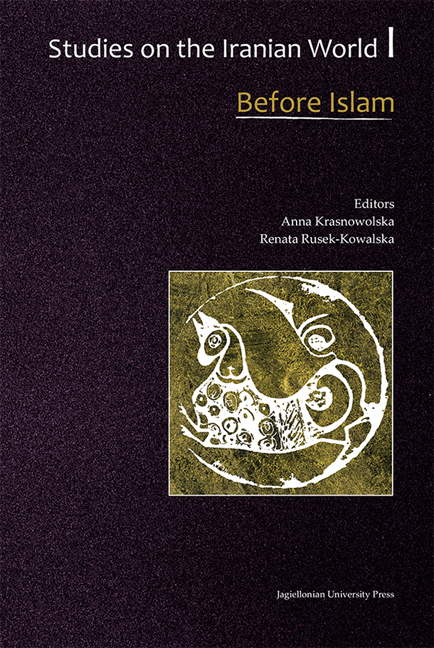Book contents
- Frontmatter
- Contents
- Foreword
- Linguistics
- Literature
- Religion
- Aspects of Hymnology in the Manichaean Community in Turfan
- Arǝdvī Sūrā Anāhitā: Considerations on the Greek ἀρχἡ
- Ohrmazd's Plan for Creation according to Book Three of the Denkard
- The Pahlavi Translation of Yašt 3
- On the Old Iranian Social Space and Its Relation to the Time Ordering System
- History
- Archaeology
Arǝdvī Sūrā Anāhitā: Considerations on the Greek ἀρχἡ
from Religion
Published online by Cambridge University Press: 12 January 2018
- Frontmatter
- Contents
- Foreword
- Linguistics
- Literature
- Religion
- Aspects of Hymnology in the Manichaean Community in Turfan
- Arǝdvī Sūrā Anāhitā: Considerations on the Greek ἀρχἡ
- Ohrmazd's Plan for Creation according to Book Three of the Denkard
- The Pahlavi Translation of Yašt 3
- On the Old Iranian Social Space and Its Relation to the Time Ordering System
- History
- Archaeology
Summary
SUMMARY
In the Ābān Yašt, the description of the physical states of the water (liquid as in rain, vapor as in the winds and clouds, solid as in sleet) reveals an aspect of the Avestan ‘scientific thought,’ which anticipates the Milesian idea of ἀρχἡ in Thales doctrine. If the main goddess of ancient Iran was nothing but pure water, it would be worth wondering about the modalities according to which Greek scientific thought was not just the result of the direct observation of natural phenomena, but also the consequence of pondered assessments on the physical idea of the Avestic material universe. The hypothesis is that Arǝdvī Sūrā Anāhitā was never depicted. It would be useful to reflect on the potential historical and religious consequences of an absence of her images and to investigate how such a unique religious approach might have influenced the Greek scientific and philosophical thought.
The case which undergoes your attention is the conception of water expressed by the Archaic Greece and the one present in the Avesta, more precisely the idea of ἀρχἡ in Thales and the notion of water narrated in Yašt 5.
Concerning Thales, we do not have any original text and Aristotle is the only reliable source for the notion of the ἀρχἡ. In his physical doctrines, notably in Metaphysics, Aristotle considers Thales as the first philosopher. This opinion could be a distortion, an artificial construction made purposely by Aristotle to find in Thales the initiator of his philosophical conception. Modern philosophical criticism disagrees on the origin of the Ionian thinkers: most consider them the very first philosophers and scientists of the Greek world; some instead, cautiously trace in their works influences from the Near East; while very few are willing to see in the so called Schoolof Miletus the development and expansion of an older speculation which is rooted in the worlds of those considered barbarians.
Regarding Yašt 5, we don't know the period of its composition, although according to Malandra its drafting is late Achaemenid. This hypothesis would place the text within a religious reform much wanted by Artaxerses II in order to harmonize new divine figures with others more archaic of the Iranian pantheon. The hymn possibly syncretises two divine figures: the older goddess of water and the Anāhitā of the Old Persian inscriptions.
- Type
- Chapter
- Information
- Studies on the Iranian World: Before IslamMedieval and Modern, pp. 139 - 152Publisher: Jagiellonian University PressPrint publication year: 2015



